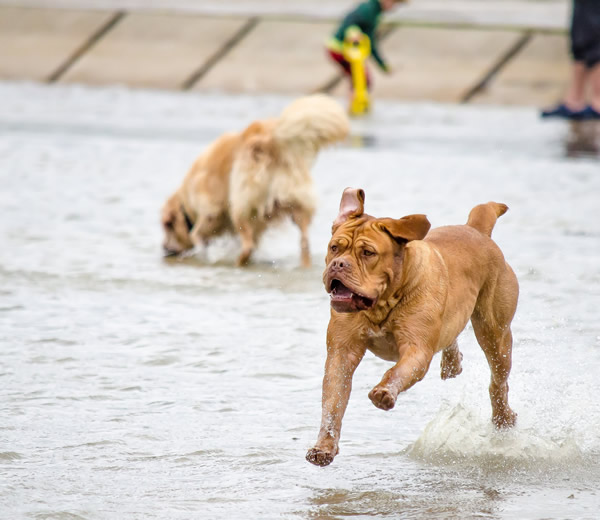 Summer has hit Australia! So if you’re considering a trip to the beach with your furry friend or a dip in the pool this summer, then check out this post from our friend and PAW by Blackmores ambassador, Dr Katrina Warren, about what to watch out for when keeping your canine companion cool this summer.
Summer has hit Australia! So if you’re considering a trip to the beach with your furry friend or a dip in the pool this summer, then check out this post from our friend and PAW by Blackmores ambassador, Dr Katrina Warren, about what to watch out for when keeping your canine companion cool this summer.
Summer is all about swimming. But is it okay to let your dog swim in your pool, and the ocean? And how do you take care of his/her coat and ears if your pooch is a regular dipper?
Taking a dip with your pooch can be oodles of fun, and under the right conditions, it’s quite safe to swim with your dog in a pool or in the ocean. But there a few things you need to consider before you set off for the water with your furry friend:
- The first is to make sure you’re in a place that welcomes your best friend. Establish that you’re on a dog-friendly beach (owners caught with their dogs on restricted beaches can be fined more than $300 by some councils) or at a dog-friendly pool.
- The next key things to consider are ears and skin. Ears become an issue when dogs swim as some may develop otitis externa (infection of the external ear canal). The latter tends to happen because moisture builds up in the external ear canal, leading to overgrowth of normal flora. Signs of otitis externa include head-shaking, ear-scratching and even very smelly ears.
The use of a good quality ear cleaner after swimming can reduce the risk of this ailment. If you notice that your dog’s ears are looking red, or if you notice a bad smell or discharge, see your veterinarian as soon as possible. PAW by Blackmores has a gentle ear cleaner that does the trick. - Skin is the largest organ in a dog’s body. Some dogs have more sensitive skin than others and are prone to inflammation or infection (dermatitis). This is often associated with itching, which can be constant in some dogs. Pool water is usually not a problem for dogs, but it is important not to allow dogs – however keen they seem – to swim in, or drink, dirty pool water. This can result in skin infections or gastrointestinal upsets. To remove residual chlorine or sand from the coat, give your dog a post-dip rinse under the hose and a gentle towel dry. Use a face washer or similar to dry the ears.
- If your dog has pre-existing dermatitis, it is best to avoid swimming all together. Your veterinarian can recommend a suitable shampoo. Instead, try putting a cold towel on them if they are overheated and always ensure there is a shaded area in your yard for them to lie so they aren’t exposed to direct sunlight and heat for prolonged periods of time.
- Just like people, some dogs are stronger swimmers than others. If you’re not sure what of your dog’s skills in the water, start at the shallow end and wade in alongside him or her. If your pooch wears a life vest, ensure that it is fitted correctly so that he or she doesn’t get caught in it.
- Water safety applies equally to dogs, too – never allow a dog to swim unsupervised. When it comes to ocean swimming, remember that pets can get caught in rips, too, so avoid swimming in rough conditions.
- If you are spending time with your dog by the ocean, take care around rocks and oysters which can lead to abrasions and cuts. And remember that paralysis ticks love the coast, so make sure your best mate’s tick prevention is up to date.
About Dr Katrina Warren
Dr Katrina Warren is a veterinarian and best known for her work in the media as a presenter and spokesperson. She has worked across all media platforms, including TV, radio, print and online. She has also authored four books, hosted many events and most recently created an online education program for dog owners. Her real passion is helping pet owners enhance the special bond that is shared with pets. She is a proud ambassador of PAW by Blackmores.
You can catch Katrina Warren via Facebook, Twitter, Instagram, her YouTube channel. Visit www.drkatrina.com for more information.